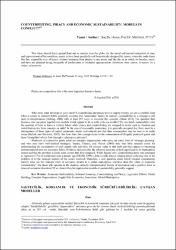| dc.contributor.author | Pıtts, Mıchael | |
| dc.date.accessioned | 2017-06-22T08:46:23Z | |
| dc.date.available | 2017-06-22T08:46:23Z | |
| dc.date.issued | 2013 | |
| dc.identifier.uri | https://hdl.handle.net/20.500.11776/1657 | |
| dc.description.abstract | Who owns what develops in your mind? Counterfeiting and piracy have a lengthy history, yet are a youthful field when it comes to research.While generally accepted that 'sustainable' means 'to endure', sustainability as a concept is still open to interpretation (Holling, 2000) with at least 255 ways to visualize this concept. (Mann 2011) The question then becomes can you piece together two models which appear to be at odds with one another? On one hand, sustainability asks the question of how to leave a rich(er) future while piracy and counterfeiting are wrapped in terms such as freedom and redistribution.Are these concepts at odds? In the area of sustainable economics, it is generally accepted that there must be a management of three types of capital (economic, social, and natural) and that their consumption may be seen to be under stress (Dyllick and Hockerts, 2002). But how does this concept relate to the consumption of illegally produced goods and those 'intangibles' which flow through a cyberspace universe? Producers of counterfeit goods often are complex organizations who carry out some form of ‘strategic planning’ and who may have well-defined strategies. Staake, Thiesse, and Fleisch (2009) note that little research exists for understanding the mechanisms of such supply side activities. Of concern today is that such activities appear to becoming institutionalized into our economic fabric. Evidence indicates that the informal economy is both significant in its marketplace impact and that the problem is likely more severe than first imagined. While figures vary, counterfeiting alone was estimated to represent 5-7% of world trade over a decade ago (OECD, 1998). Little is really known relating either to the true size of the problem or to the strategic posture of the actors involved. Therefore, a new question exists which requires examination, namely what are the strategic roles of economic pirates in a global marketplace and how does this relate to economic sustainability? Are those who operate in the shadows actually entrepreneurial drivers of innovation and a positive force in times of economic downturn? If so, should they be regulated as models of sustainability generally suggest. | en_US |
| dc.description.abstract | Aklınızda gelişen şeyin sahibi kimdir? Sahtecilik ve korsanlık araştırma için yeni bir alan olsa da uzun bir geçmişe sahiptir.”Sürdürülebilir” genellikle “dayanılabilir” anlamına gelse de bir kavram olarak sürdürülebilirliği yorumlayabilmek adına en az 255 yol vardır. Buradaki soru birbirlerinden farklı gibi görünen bu 2 modelin bir araya getirilip getirilemeyeceğidir. Diğer taraftan, özgürlük ve yeniden dağıtım gibi sahtecilik ve korsanlık birbirine bağlı kavramlar haline gelmişken sürdürülebilirlik nasıl zengin bir gelecek yaşanacağı sorusunu sorar. Bu kavramlar oranlanabilir mi? Sürdürülebilir ekonomi alanında genellikle sermayenin 3 tip yönetimi (ekonomik, sosyal ve doğa) ve bunların tüketiminin baskı altında olduğu kabul edilmektedir. Peki bu kavramın yasadışı üretilen malların tüketimi ve “soyut varlıkların” siber evrende akışıyla nasıl bir ilgisi vardır? Sahte mal üreticileri genellikle bir çeşit “stratejik planlama” yürüten ve iyi tanımlanmış stratejileri olabilen karmaşık örgütlerdir. Staake, Thiess ve Fleisch (2009) söz konusu arz yönlü faaliyetlerin mekanizmalarını anlamak adına az araştırma olduğunu ileri sürmüşlerdir. Günümüzdeki endişe bu tip faaliyetlerin ekonomik yapı içerisine kurumsallaşarak girmesidir. Bulgular göstermektedir ki; kayıtdışı ekonominin piyasa ekonomisi üzerindeki etkisi anlamlıdır ve problem düşünüldüğünden daha ciddi boyuttadır. Rakamlar farklılık arz etse de sahtecilik 10 yıl önceki dünya ticaretinin %5-7’si olarak tahmin edilmiştir. (OECD, 98) Küçük şeyler gerçekten bilinen sorunun gerçek boyutuyla ya da ilgili oyuncuların stratejik duruşuyla ilgilidir. Dolayısıyla sorulacak olan yeni soru şudur; ekonomik korsanların küresel pazarda stratejik roleri nelerdir ve bunun ekonomik sürdürülebilirlik ile nasıl bir ilişkisi vardır? Bu soru yeni incelemeleri de beraberinde getirmektedir. Peki bu gölge faaliyetleri olanlar aslında inovasyonun girişimci sürücüleri ve ekonomik kriz dönemlerindeki pozitif güçler midir? Eğer öyleyse sürdürülebilirlik modelleri önerildiği gibi düzenlenmelidir. | en_US |
| dc.language.iso | eng | en_US |
| dc.publisher | Namık Kemal Üniversitesi,İktisadi ve İdari Bilimler Fakültesi | en_US |
| dc.rights | info:eu-repo/semantics/openAccess | en_US |
| dc.subject | Economic Sustainability | en_US |
| dc.subject | Informal Economy | en_US |
| dc.subject | Counterfeiting and Piracy | en_US |
| dc.subject | Legislative Efforts | en_US |
| dc.subject | Model Building | en_US |
| dc.subject | Complex Organizations | en_US |
| dc.subject | Supply Side Economics | en_US |
| dc.subject | Innovation | en_US |
| dc.subject | Global Marketplace | en_US |
| dc.subject | Ekonomik Sürdürülebilirlik | en_US |
| dc.subject | Kayıtdışı Ekonomi | en_US |
| dc.subject | Sahtecilik ve Korsanlık | en_US |
| dc.subject | Yasal Çalışmalar | en_US |
| dc.subject | Model Geliştirme | en_US |
| dc.subject | Kompleks Örgütler | en_US |
| dc.subject | Arz Yanlı Ekonomi | en_US |
| dc.subject | Inovasyon | en_US |
| dc.subject | Küresel Pazar | en_US |
| dc.title | COUNTERFEITING, PIRACY AND ECONOMIC SUSTAINABILITY: MODELS IN CONFLICT? | en_US |
| dc.title.alternative | SAHTECİLİK, KORSANLIK VE EKONOMİK SÜRDÜRÜLEBİLİRLİK: ÇATIŞAN MODELLER | en_US |
| dc.type | article | en_US |
| dc.relation.ispartof | Balkan Sosyal Bilimler Dergisi | en_US |
| dc.department | Tekirdağ Namık Kemal Üniversitesi Dergileri | en_US |
| dc.identifier.volume | 2 | en_US |
| dc.identifier.issue | 4 | en_US |
| dc.relation.publicationcategory | Makale - Ulusal Hakemli Dergi - Kurum Öğretim Elemanı | en_US |



















